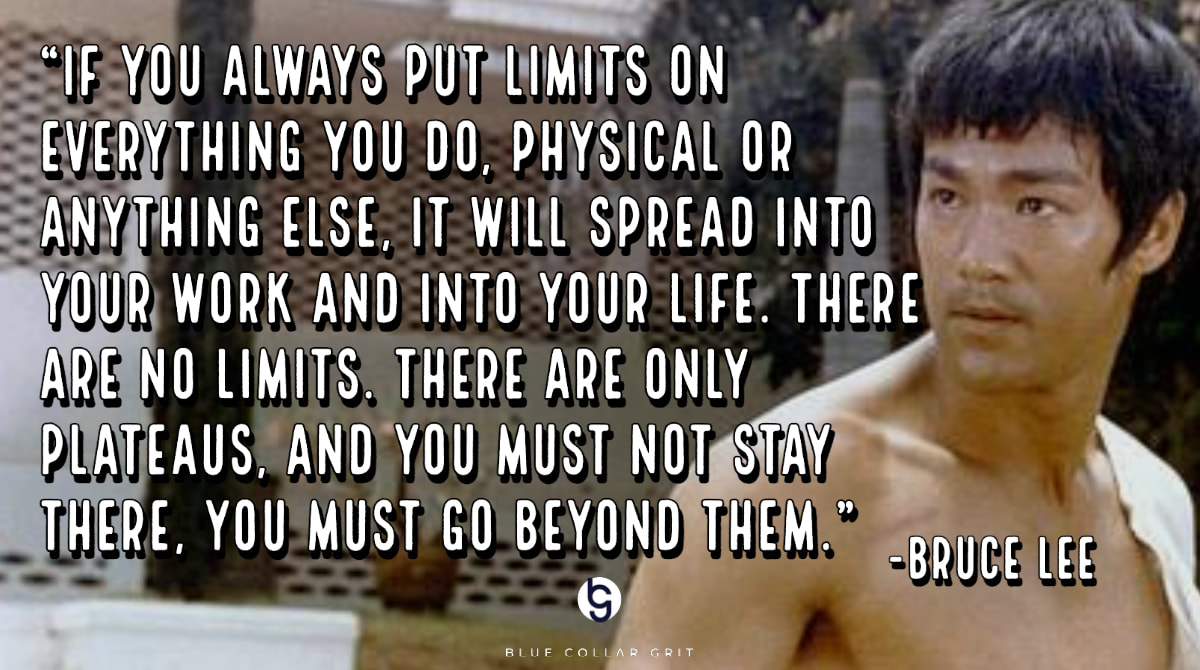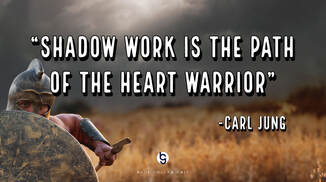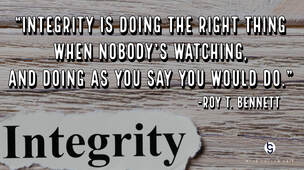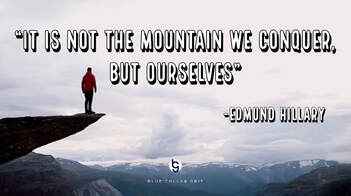Survive and RegressThe difference between a player trying to just get through, or survive, a workout in the weightroom and a player embracing, or attacking, a workout in the weightroom is significant.
The difference is apparent in the approach, as well as in the outcome. Those surviving rarely challenge themselves with heavy weight or additional reps. They push themselves to the edge of their comfort, which is typically light years below the standards of the team. Survivors persist to the point of acceptance, never beyond it. They look for excuses they can’t, rather than reasons they can. They think they’re advancing by surviving, but they’re not. All you need for proof is to watch a fighter, the opposite of a survivor. A fighter seeks out discomfort, knowing that the littering of failure is the only way to the level of performance he is aspiring to. The fighter is the standard bearer. He raises it consistently. You are more likely to have to make a fighter stop than you are to catch him skipping a rep or an exercise in search of relief. They are dismissing excuses they can’t and only accepting reasons they can. The outcome is just as different as those two approaches. Why Should We Care? Surviving as a leader yields us the same results. Allowing our team members to simply survive will do the same. Just as excellence leaves clues, so does surviving. Leaders that are surviving are only present. That may sound like a good thing, but only living in the present doesn’t allow us to honor the past or prepare for the future. A leader that is surviving has no concern for the future or use for the past. Cutting corners, just meeting deadlines, and doing the minimum all make sense if survival is the objective. Team members relegated to survival often disconnect, are the last to arrive and first to leave, and rarely engage in meaningful conversations around the team. They raise silos around themselves, robbing the group of needed trust, and never fully commit to the group. REAL TALK - Action Steps Surviving may be necessary in moments, but it can never serve as a sustainable approach. As one of my close friends reminds his captains: “You can be bad, but you can’t be bad often.” The same can be said for surviving. Here are a few ideas for helping yourself, or your team, stay out of survival mode.
Survival mode really only helps us do that, survive. We can’t progress, and we certainly can’t excel. If we’re not growing, we’re dying. If we’re just surviving, we’re regressing. For more information on building excellence in your teams, visit us at www.bluecollargrit.com. We would love to know how we could help!
0 Comments
Shadow WorkIn his book, Falling Upward, Richard Rohr defines ‘shadow work’ as “what you refuse to see about yourself, and what you do not want others to see”. He is referencing the required self-understanding necessary to transition from the first half of life, which he calls your false self, to the second half of life, your true self. Rohr’s stance is that no one ever truly enters into the second half without the necessary ‘shadow work’.
The same is true in our leadership. Replication is always the initial stage, which is ok. It gives us a foundational base to build upon. Of course, some of our bases are bigger, stronger, and simply better than others. That’s ok too. It may impact our initial effectiveness, but has little to do with our long term influence as a leader. What does impact our long term influence, however, is our ‘shadow work’. Why Should We Care? Naturally we all have areas we can improve, those weaknesses may shed a little light on our shadow but they never encompass the whole thing. Our shadow is much more than our shortcomings. Our ‘shadow work’ is more about how, rather than what. Most of us focus on whats - things we do or don’t do when addressing areas of improvement. The how of our leadership is a little more personal and harder to accept criticism on. We do anything the way we do it for one of two reasons: either we’ve never intentionally thought about how we do it, we are still just copying how it was demonstrated to us or we’ve intentionally chosen the way we do it and feel it is the best way. Both approaches are held in high esteem in our minds, neither readily open to change. If we haven’t considered our approach, then we are typically very comfortable doing it the way we do it. And, as you know, comfort isn’t something we shrug off easily. ‘Shadow work’ is uncomfortable. If we have intentionally chosen how we do it, then clearly we have a belief in that approach that will confront criticism with skepticism at best, full denial at worst. REAL TALK - Action Steps “Shadow work” as it pertains to leadership isn’t for the faint of heart. It’s also not for transactional and dictator style leadership. It is for transformational leaders aspiring to be completely authentic and maximizes their impact on those they lead. Below are a few ideas on getting started on that process.
We all have shadows to work on. The sooner we figure out what they are and do the work to improve them, the sooner our impact on those we lead will expand. For more information on building excellence in your teams, visit us at www.bluecollargrit.com. We would love to know how we could help! Our FilterA friend of mine recently asked me for advice on an important decision he had to make. There were plenty of pros and cons to both sides of the decision and he was struggling to make a decision he could have confidence in.
I don’t think his situation is uncommon. I know I’ve found myself searching for the ‘right’ answer in similar situations many times. I would think you can relate as well. Wouldn’t it be nice to have a filter, or special lens, to run these types of decisions through? Something that allows you to scrape away all of the stuff that doesn't really matter so you can focus more clearly on the few things that do? That would have to simplify the process significantly, right? Your core values are that filter. Why Should We Care? Success breeds success, that is, of course, until it doesn’t. I’m sure you are familiar with a number of companies, teams, or individuals that have experienced great success only to see a quick, drastic decline in performance. Complacency or a loss of focus on the specific mission at hand are the typical culprits. Nonetheless, sustaining success requires something more than creating it in the first place and involves a transition to something success can never be - excellence. Excellence can be sustained because it is central to us, not others. Success is simply feedback when we are held up and compared to another. If we’re using success as our gauge in decision making, which most people do, then our checkpoints fluctuate with what provides the best opportunity to win. There’s no consistency, and certainly no simplicity. The possibilities to consider are endless. Since excellence is specific to each of us, the things we truly have to consider in any decision making process becomes limited quickly. Our core values provide our guide to excellence. Each decision we make with our core values as our filter, enhances our level of excellence. REAL TALK - Action Steps Here are a few questions to consider around your core values the next time you have an impactful decision to be made.
We often find ourselves searching for guidance and answers with every significant decision we make. That doesn’t need to be the case. Allow your values to be your guard rails and you will not only gain clarity, but you will also grow your integrity and confidence by living into the person you want to be. For more information on building excellence in your teams, visit us at www.bluecollargrit.com. We would love to know how we could help! Owning Your IdentityLet’s start here:
Do what you say you’re going to do. Seems simple enough … apparently it is not. There are two facets to this aspect of integrity: the things we tell others and the things we tell ourselves. Both are important, but neither seem to be all that valued any more. Once upon a time, not doing what you said you were going to do wasn’t something we shrugged off with an “oh well, I forgot” or dismissed completely with a half-hearted, “my bad”. At one time the failure to follow through on your word simply made you a liar. There was no softening of the accusation and no excuse to dismiss you from responsibility. You were your action (spoiler alert … this hasn’t changed). The lies we tell others damages the confidence others have in us. The lies we tell ourselves damages the confidence we have in us. Each one of those New Year’s resolutions we make and quit on, each attempt at dieting that we start with great intentions only to bail out on come the weekend, and each time we swear to ourselves that it’s the last time we allow someone to treat us like that … each one of those failures to follow through on our word to ourselves, is another blow to our personal integrity. The lies to ourselves are just as damaging as the lies to others. Why Should We Care? Here’s the thing: you are what you DO. You aren’t what you say. You aren’t what you say you are. You are what you DO. You aren’t what you did. You aren’t what you say you’re going to do. You are what you DO. Your ethos is in your actions, not your words. That will not change, ever. Your integrity is dependent on doing what you say you’re going to do. Other’s belief in you hinges on your willingness to do what you say. Your belief in yourself is being lifted or dampened with each of these seemingly innocent choices as well. Recognizing that it is simply a choice is significant. We are not victims of circumstance. REAL TALK - Action Steps Our integrity is how well we are living to our values. I’m assuming most don’t have dishonesty as a core value. Intentionality is a must, but here are a few other ideas to help maintain our integrity as it pertains to following through on your word.
Doing what you say you’re going to do seems like a really simple ask. For those in your inner circle, I hope that’s the case. For all those you lead, I’m sure it’s not. It’s our responsibility to help them understand the significance of their follow through on their self-image and impact with others. For more information on building excellence in your teams, visit us at www.bluecollargrit.com. We would love to know how we could help! Pick-up LessonsAs a self-confessed old-head, one of the things that disappoints me the most about the state of youth sports is the loss of free play. It seems that virtually everything nowadays is organized. And, while that may provide a structure that fits nicely into our schedule and ideals, it often misses on other critical values that we frequently find absent in young adults … or old adults.
From the age of twelve to fifteen, Sunday afternoons meant pick-up tackle football games with my older brother. There was nothing I looked forward to more during that time than those games and the rides to and from them with Johnny. I learned quickly that toughness was a required trait. It wasn’t optional or desired, it was required. It was never talked about, but it was clearly understood. With a gravel driveway as the fifty yard line, there were certainly a fair share of injuries. What I learned very quickly is that the injury didn’t matter, how you reacted to the injury however would etch your future in stone. If a player suffered a minor injury, but acted as if it was catastrophic, they immediately relegated themselves to the last pick - or not even being picked. Forgiveness would eventually set in and allow them to come back and play again … in a few weeks, not a few minutes. Coming back into the game after faining an injury was met with immediate disgust and ridicule that no one ever attempted to do it more than once. The message was very clear: if you can play, you play; if you can’t, you don’t. The injury was irrelevant after the fact. Think FIFA soccer or NBA basketball. They wouldn’t have been able to play on Sundays with us. Why Should We Care? Win or go home used to be a real thing. Now it only occurs at the end of a long weekend of games after everyone has already played numerous times. Highlight videos have been bought and Tweets have been posted, so what’s really left? Does it really matter if you win or not? When you play legit pick-up, against real competition, that is not the mindset. First of all, there are no cameras or tweets. The highlights are limited to the best kind - the ones that are embedded in our mind and exaggerated to others on the car ride home. From my junior year of high school until I was three to four years out of college, my summer included regular pick-up basketball games at Thomas Cloud Park in Huber Heights and on the University of Dayton’s campus. Those games, often with older players, taught me quickly that winning was the only thing that mattered in pick-up basketball. Winners stay. If you lose, it could be hours before you got the chance to play again - and that’s if you were lucky enough to get picked up by another team. I was never that lucky. So, I had to find ways to help my team win. It’s amazing how quickly players accepted their roles and played to their strengths when the pressures of leaving the court for an extended time were constantly staring you in the face. The lessons abounded. Humility was accepted or the need for it realized quickly. Playing hard was not optional. Unselfishness was demanded. You willingly sacrificed for the team. You spoke honestly with teammates for the good of the team. You owned your mistakes. You enjoyed the pureness of the struggle and the honesty of the results. REAL TALK - Action Steps Here are a few ideas to keep in mind that we have to be intentional with now that so much free play has been removed from the maturation process of our upcoming leaders. These still must be learned, one way or the other.
I’ve commented before that I think I could make fail-proof hirings if I could just play a little pick-up basketball with each potential employee. It’s much more difficult to give a textbook answer in the heat of a pick-n-roll than it is in a comfy office chair. For more information on building excellence in your teams, visit us at www.bluecollargrit.com. We would love to know how we could help! |
About bcI'm a teacher, coach, and parent seeking excellence while defining success on my own terms. Archives
July 2024
Categories |






 RSS Feed
RSS Feed